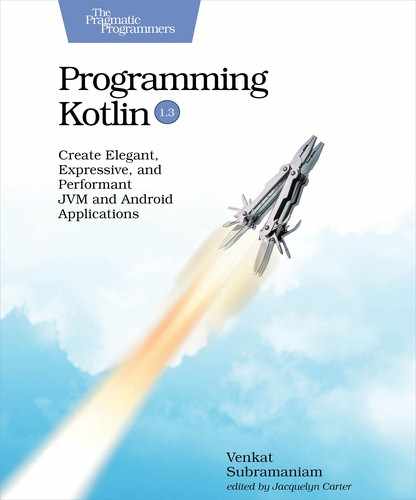Delegating to a Parameter
In the previous example we wrote Worker by JavaProgrammer(), which says that the Manager instance is delegating to an implicitly created instance of the JavaProgrammer, but that poses two issues. First, the instances of Manager class can only route to instances of JavaProgrammer, not to instances of any other Worker implementors. Second, an instance of Manager doesn’t have access to the delegate; that is, if we were to write a method in the Manager class, we can’t access the delegate from that method. It’s easy to fix those limitations by tying the delegate to the parameter passed to the constructor instead of to an implicitly created instance.
| | class Manager(val staff: Worker) : Worker by staff { |
| | fun meeting() = |
| | println("organizing meeting with ${staff.javaClass.simpleName}") |
| | } |
The constructor of the Manager class receives a parameter named staff which also serves as a property, due to val in the declaration. If the val is removed, staff will still be a parameter, but not a property of the class. Irrespective of whether or not val is used, the class can delegate to the parameter staff.
In the meeting() method of the Manager class, we’re able to access staff since it’s a property of the object. Calls to methods like work() will go to staff due to delegation. Let’s confirm this behavior by creating a couple of instances of this version of Manager.
| | val doe = Manager(CSharpProgrammer()) |
| | val roe = Manager(JavaProgrammer()) |
| | |
| | doe.work() //...write C#... |
| | doe.meeting()//organizing meeting with CSharpProgrammer |
| | |
| | roe.work() //...write Java... |
| | roe.meeting()//organizing meeting with JavaProgrammer |
The first instance of Manager receives an instance of CSharpProgrammer, and the second instance receives an instance of JavaProgrammer. That shows that the delegation is flexible; it’s not tied to one class, JavaProgrammer, and may use different implementations of Worker. When work() is called on the two instances of Manager, Kotlin routes the calls automatically to the respective delegates. Also, when meeting() is called on the Manager instances, those calls send an invitation to the respective staff properties that are part of the Manager instances.
